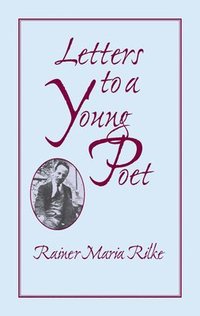Letters to a Young Poet

Författare: Rainer Maria Rilke
Genre: Brevsamling
Ämnesord: filosofi, psykologi, religion, kultur
Utgivningsår: 2002
ISBN: 9780486422459
Genre: Brevsamling
Ämnesord: filosofi, psykologi, religion, kultur
Utgivningsår: 2002
ISBN: 9780486422459


Köp boken på amazon.se (betald länk)
* Som Amazon-associates tjänar vi pengar på kvalificerade köp.
Begagnade:

Letters to a Young Poet, Rainer Maria Rilke
Translated, with an Introduction and Commentary by Reginald Snell
One of the great poet letter-writers of European literature. Rainer Maria Rilke (1875-1926) sometimes received correspondence from young aspirants. They told him the secrets of their hearts, and he replied with sound advice that occasionally revealed elements from the inner workings of his own poetic identity. Upon learning that the famous poet had attended the military academy where he himself was enrolled, a student ventured to send Rilke some of his own verses. The older artist responded to the novice's request for guidance with this series of letters - a remarkable archive of insights into the ideas behind Rilke's greatest poetry.
These ten letters, written during an 18 month period that commenced in 1903, coincided with an important stage in the Austrian poet's artistic development. The letters bear many of the themes that later emerged in Rilke's best works, and the poet himself afterward stated that his letters contained part of his creative genius. This volume offers essential reading for scholars, poetry lovers, and anyone with an interest in Rilke, German poetry, or the creative impulse.
Dover (2002) unabridged republication of the work published by Sidgwick and Jackson, London, 1945. Translator's preface. Translator's introduction. Introduction by the Young Poet. Commentary. Rilke in English.
Utdrag ur boken:
You ask if your verses are good. You ask me. You have previously asked others. You send them to journals. You compare them with other poems, and you are troubled when certain editors reject your efforts. Now (as you have permitted me to advise you) I beg you to give all that up. You are looking outwards, and of all things that is what you must now not do. Nobody can advise and help you, nobody. There is only one single means. Go inside yourself. Discover the motive that bids you write; examine whether it sends its roots down to the deepest places of your heart, confess to yourself whether you would have to die if writing were denied you. This before all: ask yourself in the quietest hour of your night: MUST I write? Dig down into yourself for a deep answer. And if this should be in the affirmative, if you may meet this solemn question with a strong and simple "I MUST", then build your life according to this necessity; your life must, right to its most unimportant and insignificant hour, become a token and a witness of this impulse.
Bok recensioner av Letters to a Young Poet :
2013-09-15 22:47
Blev intresserad av boken när jag insåg att den då och då kommit upp i olika sammanhang över en tidsperiod på femton år. Dess ord verkar ha berört och inspirerat många. Det är en liten samling brev från en österrikisk poet till en ung man som skickar sina egna dikter i hopp om att få en bedömning av dem och tips om hur han ska komma vidare i skrivandet och livet. Det börjar med ödmjuk uppmuntran om den yngres önskan att skriva och fortsätter till djupare ämnen. Det är intressant att läsa Rilkes tankar om framtiden vad gäller feminism och sexualitet som idag, hundra år senare, kommit mycket längre mot det han skriver om, även om vägen kvar är lång. Läsvärd.
Betyg 3


"
Köp boken på amazon.se (betald länk) * Som Amazon-associates tjänar vi pengar på kvalificerade köp.
Skriv egen bokrecension till Letters to a Young Poet
Liknande böcker:
Radiotider
G. Blixt
G. Blixt
Historier från cirkus
U. Ericson
U. Ericson
I Myggans vänkrets
U. Ericson
U. Ericson
En Tesked Jord och Hav
D. Nayeri
D. Nayeri
Från scen och cabaret
U. Ericson
U. Ericson
Gustaf Tenggren - En b..
L. Emanuelsson
L. Emanuelsson
Hugin & Munin berättar..
. Hjorth Nielsen
. Hjorth Nielsen
Sibirisk uppfostran
N. Lilin
N. Lilin
Det var bättre förr
B. Osman
B. Osman
Martin Luther - Den of..
T. Blom
T. Blom
